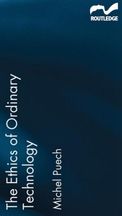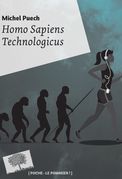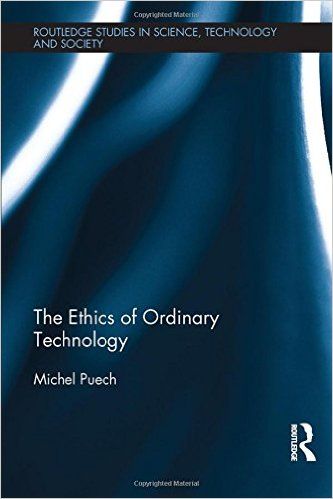Accueil
MP site personnel
Documents
universitaires
Médias
Grand Public
et Jeunesse
Book
The ethics of ordinary technology
Livre
Homo Sapiens
Technologicus
Livre
Développement
Durable
Bibliographies
commentées
Papers in
English 
Interventions
FORUM


The ethics of ordinary technology
New York, Routledge, 2016

About this book
Before talking about its content I want to say this about how to get this book and why the hardcover copy is currently so expensive:- The 21 first pages are available online (Google Books; Routledge website; Amazon shows the Index too; I provide more below).
- The electronic version is cheaper, at a "normal" price for an academic book.
- The hardcover book is intended for libraries (plus rich people of course) so what you can do is have one copy bought by the library in your institution or your place and then next year Routledge will publish a paperback version at a reasonable price – and that is exactly the plan!
- Last resort solution: learn French, you can have the paperback reprint of my French book Homo Sapiens Technologicus for €13 (you save €100!... but it is not the same book, it is the previous one).
- If you consider (sincerely) writing a review for a (credible) journal, drop me an email, or directly get in touch with giana.georgi@taylorandfrancis.com.
____________
Wisdom Practices for Living with Technology - Review of The Ethics of Ordinary Technology, by Michel Puech (in case you don't have the 20$ to purchase it try this :), a very positive (understatement) review of this book, by Richard S. Lewis, in Techne which is the reference journal for the kind of phil-tech I am doing... - Techné: Research in Philosophy and Technology, 22:2 (2018): 283–286, DOI: 10.5840/techne201822278.
Unabashed praises
Shamelessly, I quote the appreciation of first readers who mean much to me:- "The culture of technology needs moral guidance, the philosophy of technology needs new life. Michel Puech’s book gives us both."
Albert Borgmann, University of Montana, USA. - "The question of how to live a good life—a pressing question for any thoughtful person—has taken on a particular urgency as the pace of technological change increasingly configures the world we wake up to every day. In this bold, lucid work, Michel Puech proposes approaching this question by looking to a realm traditionally neglected by many philosophers as worthy of serious attention: ordinary life itself. Deftly supporting his analysis with his extensive knowledge of diverse philosophical traditions, Puech brings the familiar world of everyday "micro-actions", such as texting, driving, and making coffee, before our eyes in a fresh light, showing how they can promote flourishing without promoting complacency or preventing resistance to technology when appropriate. Written in a spirit of intellectual joy, this is an important volume not only for ethicists and philosophers of technology, but for all with an inquiring mind."
Diane P. Michelfelder, Macalester College, USA.
Chapters abstracts
Chapter 1. An Introduction to Technoethics
This chapter defines ordinary technoethics and highlights its main concepts. (1) It starts with a justification for the pressing need for an ethics in technology. The main argument is that technology characterizes modernity and that, in spite of the existing traditions in philosophy of technology, a specific technoethical approach needs to be pursued. It is emerging from recent trends in philosophy that insist on the embedded moral facts and values pertaining to contemporary technology. (2) The methodology of the book is introduced and justified in this chapter. The crisis of moral philosophy in the modern world is briefly recalled and technoethics is suggested as an opportunity for innovation in terms of subject matters and methods. (3) A precise method is concisely detailed. The pragmatic dimension of the book is justified as a reaction against scholasticism in moral philosophy. The key notion in the suggested method for technoethics is the notion of “ordinary,” introduced here and developed in Chapter 3. The grid of virtues and in particular of wisdom practices that will structure the book is introduced here in a simple form, which will expand in the development of the argument.
Chapter 2. Technosapiens: The Coevolution of Nature, Humankind, and Technology
This chapter defines the subject matter of the entire book: the species that we are, Homo Sapiens Technologicus or Technosapiens in short. (1) This new species must understand itself as a natural species because technology is natural for humankind. A new moral anthropology is then engaged: new because it refuses the dichotomy between natural and artificial and new because it situates the technological nature of humankind in the ordinary of everyday life. The next philosophical task is to survey the technosphere, our lifeworld, looking for the specific flourishing opportunities that are afforded by this unique environment. Flourishing emerges as a key concept for technoethics. It is different from both technophobic naturalism and technophilic transhumanism. (2) Ethics is deeply transformed by the irruption of two stakeholders, nature and technology. The three elements of coevolution (humankind, nature, technology) develop interdependent teleologies, which establish a new context for ethical questions. (3) This chapter concentrates on the present stage of coevolution even though it gives neither an interpretation of its past nor a prophecy about its future. “Presentology” describes the revolutionary context of the present technosphere with the help of coevolutionary laws that highlight the ubiquitous mediation by technology and the ecological consciousness in the present era.
Chapter 3. Ordinary Technologies and Ethical Significance
The importance of ordinary behavior in technology leads to a new vision in technoethics. From this point of view, values are construed differently. They are immanent in the ordinary use of humble devices or in focal familiar practices. (1) A real “philosophy of the ordinary” provides an innovative approach to modern material existence. On this basis, the revolutionary impact of digital and “smart” technology can be interpreted as the becoming ordinary of the extraordinary. (2) The most important innovation is ethical and not technical. Instead of the frequent disregard for a supposed modern dereliction, technoethics brings to light the authentic experience of human and ethical values in the technosphere. (3) What is lacking in current views on modernity is therefore a specific awareness of this ethical significance: this is the first step in ordinary wisdom. (4) An extremely rich experience of care, bonds, and even attachment receives in this chapter long due attention, turning ordinary technology into a dignified ethical concern.
Chapter 4. The Self in the Age of Pervasive Technology
This Chapter introduces the main character in technoethics: the self. (1) It investigates the eclipse of the self in human and social sciences and then suggests a return of the self as the key innovation for regenerating an applied ethics in the present technosphere. The ethical turn in philosophy of technology remains focused on the individual agent in ordinary technology: the self. (2) The central concern for the self is care. I argue that appropriate care originates in self-care. Its connection to human values is based on a self-constitutive property: consistence. (3) The ethical self can construct itself in modernity in adopting a constructive attitude toward technology. The self is then able to delve into the resources of the technosphere and the infosphere. The logic of access and the emergence of generativity in this process receive particular attention. (4) The skills and meta-skills that can give access to a good life in the present technosphere are explored from the point of view of the ordinary. Health as a self-care practice offers a paradigm for the overall practice leading to wisdom in modernity: self-realization.
Chapter 5. Deep Sustainability and Personal Microactions
This Chapter considers collectives in the technosphere and infosphere from the point of view of a technoethics centered on the self – a self who is harnessing the resources of the technosphere and infosphere. (1) A comprehensive notion of sustainability is defined, in an ethical sense that tries to encompass not only environmental but also political and economic issues. Personal microactions lead to a bottom-up reconstruction of environmental, political and social acceptability. This acceptability is a form of ethical sustainability. (2) The concept of microaction opens a new field, post-political and post-institutional, for human agency. This form of action is defined and instantiated. It proves to be a new form of resilience for individuals as well as collectives. It addresses the failure of institutional governance on a certain number of global issues. (3) Among existing trends in social policy, the movements for “inclusion” inspire an approach to ordinary technology as an essential inclusive means in modernity. Designing and understanding inclusive ordinary technologies is a challenge for the present time.
Chapter 6. Ordinary Wisdom in the Technosphere
This concluding Chapter enters into the details of practical wisdom in the technosphere. (1) A specific notion of wisdom is defined resulting from the requirements of technoethics. This wisdom is fundamentally practical and it is offered as an alternative vision for action in the contemporary world. (2) Ordinary engagement prevails in the practice of this modern wisdom. Zen-like awareness and caring for the ordinary transform the set of values for human behavior in the technosphere and in the infosphere. This practice consists in down-to-earth microactions and in a meta-engagement for wisdom. (3) Following Table 1.4 (Wisdom, Elementary) the argument elaborates on the six fundamental practices of wisdom in a technological environment (awareness, autonomy, harmony, humility, benevolence, courage). (4) Following Table 6.1 (Wisdom Reference Table), the final Section comments on the multifaceted existential virtuosity through which a sapiential ethics endeavors to change life in the technosphere.
Contents
AcknowledgmentsPreface
1 An Introduction to Technoethics
1.1 Why Ethics About Technology and How?
Modernity / Technology
From Philosophy of Technology to Technoethics
The Agency of Artifacts
The Pragmatic Ethical Turn
Embedded Values in Technology
1.2 Ethical Paradigms and the Question of Technology
The 20th Century Crisis in Moral Philosophy
Applied Ethics
Pragmatism in Ethics
Ethics vs. Politics
Technoethics vs. Patronization
1.3 Methods for Technoethics in the Ordinary
Practical Wisdom vs. Sterile Scholasticism
A Quick View of the Ordinary
Inspirations and Methods
An Ethics of Wisdom
2 Technosapiens: The Coevolution of Nature, Humankind, and Technology
2.1 The Naturality of Technology: Human Nature
Philosophical Anthropology and Moral Anthropology
From the Naturality of Technology to the Primacy of Ordinary Technology
The Human Natural Technosphere
Human Flourishing in the Technosphere
The Worst Technoethical Paradigm: Natural vs. Artificial
The Second Worst Technoethical Paradigm: Transhumanism
2.2 Technology as the Third Insider
New Stakeholders in Ethics: Nature, Technology
Three Teleologies
Non-Autonomous Technology
The Darwinian Logic of Coevolution
2.3 The Present Stage and the Potential for Coevolution
From Coevolution to Harmony
Presentology and not Futurology
The Promise of Technology
Laws and Super-laws of Coevolution
The Technosphere Revolution
Ubiquitous Mediation
Ecological Consciousness
Hybrid Ethics (Ordinary)
2.4 Human Threads in the Coevolution Braid
The Human Agent: We Are It
Affirming Human Values
Progress and Loss
How Better? Flourishing and Dwelling
3 Ordinary Technologies and Ethical Significance
3.1 The Ordinary in Contemporary Life
Philosophy of the Ordinary
It is an Ordinary World
Ordinary Technology Familiarity
Immersed into the Digital, Surrounded by the Smart
3.2 The Ethical Importance of the Ordinary
The Ordinary as Ethical Commitment
Disregard for the Ordinary: Modernity as Dereliction
The New Ethical Importance of the Ordinary
Use, Affordance, Commodification
3.3 Awareness and Ordinary Virtue
Awareness as a Virtue
Stupidification and Resistance
Ordinary Wisdom
3.4 Care for Artifacts and Ordinary Attachment
Bonding with Artifacts
Caring for Artifacts
Attaching to Artifacts
4 The Self in the Age of Pervasive Technology
4.1 The Return of the Self
The Self as Project in Modernity
The Ethical Turn
Beyond Poiesis: Praxis
4.2 Self-care and Consistence
New Beginning in Care
From Care to Self-care
Self-care and Human Value
Consistence
4.3 Resources of the Self
From Industrial to Digital Modernity: The Digital Self
Constructive Attitudes
Flow and Access
Self-governance and Generativity
4.4 The Good Life in Ordinary Technology
Refocusing the Good Life on the Ordinary Technosphere
Meta-literacy, Meta-empowerment
Ordinary Values for the Good Life in the Technosphere
Health as Self-care in Technological Affluence
Self-realization
5 Deep Sustainability and Personal Microactions
5.1 Extended Meanings for Sustainability
Ethical Sustainability
A New Political Sustainability
Acceptability: Societal Sustainability
Sustainable Use
5.2 Microactions: Post-political and Post-institutional Engagement
The Concept of Microaction
Voluntary Simplicity
Collaborative Microactions
The Limits of Politics and Institutions
Post-institutional and Post-political Action
Resistance, Resilience, Self-reliance
5.3 Inclusive Ordinary Technology
Theory of Inclusive Technology
The Question of Design
The Soft Power of Inclusion
Forced Inclusion: Hacking and Piracy
6 Ordinary Wisdom in the Technosphere
6.1 Which wisdom
Wisdom, but Practical
An Alternative Framework for Modernity
6.2 Ordinary Engagement
Engagement as a Value and a Wisdom Value
The Ordinary as Engagement: Zen Meditation and “Samu"
Meta-engagement
Exercise
6.3 Practices of Wisdom in the Ordinary Technosphere
Awareness: The Beginning of All Wisdom
Autonomy: Waging Invisible Moral Wars
Harmony: Appreciative and Active Skills
Humility: The Real Strength
Benevolence: Realizing Non-duality
Courage: The Missing Resource
6.4 Existential Virtuosity for the Contemporary Self
Virtuosity
Desirable Acquired Conditions: Serenity, Authenticity, Consistence
Desirable Acquired Capacities: Integrity (Honesty), Generosity, Resistance
Necessary Sensitivities: Compassion, Empathy, Aversion to Violence
Ethical Skills: Non-confrontation, Non-violence, Frugality (Temperance)
Useful Practices: Meditation, Life Hygiene, Bodily Maintenance
A Final Word on Sapiential Technoethics